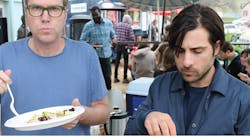With the title “7 Chinese Brothers,” one might expect a Quentin Tarantino style shootout with Triad gangsters. Rather this film is about a 30-something slacker, played by Jason Schwartzman, who eventually finds himself while working at a quick lube shop. To add a layer of authenticity to the project, Austin, Texas-based director Bob Byington decided not to head to Hollywood to build sets, but instead turned to a local shop.
Kwik Kar Southwest in Austin fit the bill perfectly for what Byington wanted, in part because he wanted the setting to look like a real shop — not a movie set dressed to look like a shop.
“We had authenticity that you couldn’t get with any set,” said Byington, who is noted for his past films including “RSO,” “Harmony and Me” and the award winning “Somebody Up There Likes Me.” “This made the movie really seem much more authentic.”
Byington has made a mark as a director for his satirical treatment of the blue collar demographic, and “7 Chinese Brothers” certainly played into that — as Schwartzman’s character is a bedraggled sad sack who spends much of his time with his loving grandmother (Olympia Dukakis) and her nursing home supervisor Major (Tunde Adebimpe).
The film, which was actually written in 2001, has a timeless quality to it. It is a contemporary piece that shows daily life that could be anytime from the past 30 years. Rather than rush to produce it, Byington opted to take repeated passes to improve the story — until everything clicked with Schwartzman stepping into the lead role of Larry.
Instead of casting blue-collar jobs, or even the quick lube business, in a bad light with a slacker character, Byington showed the right job could be redeeming for characters such as Larry.
“I agree; in fact when I was introduced to Jason in costume, I told him we would not hire him,” said Mark Welp, owner and operator of Kwik Kar Southwest. “But that fit his persona in the movie. We take particular pride in employees that use us as a stepping stone to better opportunities and career growth.”
Of course, to get the corporate office behind the project did take a some convincing, especially given the film included a scene where Larry was told he needed to vacuum up as much change as he could from customers’ vehicles. There is a consequence to those actions, but the corporate office still needed convincing.
“We really had no idea what the movie was going to be about when they approached us, other than the main character worked at a lube center,” Welp added. “We did see the section of the script that related to our building but it was different in the final cut. Kwik Industries did not want their logos or anything related to Kwik Kar identified in the movie. Since Kwik had no idea how this would reflect on their name and would have no control, they thought it best not to be identified in it.”
Such changes didn’t really impact the end story, however. Schwartzman remained the star of the film and filming the movie at an actual shop did lend authenticity Byington sought. However, shooting in a working shop did cause a few unexpected headaches.
“Fortunately we are closed on Sunday,” Welp explained. “They used three Sundays to do most of the filming. They did use one Monday and worked around our operating shop.
“It was interesting. Our prior shop in Dallas was used for some AOCA training videos, so we had some introduction. My wife, and active co-owner Jan said it was interesting to walk upstairs and see Olympia Dukakis putting on makeup in our store room!”
Where things really became interesting, according to Welp, was on the Monday shoot day — as Kwik Kar Southwest became both a working film set and a working shop.
“That Monday we were open, (but) we let them put some banners with discounts on the back bay doors,” Welp said. “Discounts that we would not normally offer. Of course, we had a customer come in and want that discount. We honored it.”
Welp was able to suggest a few tips that helped Byington understand how a shop operates. As a director that strives for authenticity, he was eager to be sure that the shop functioned on screen as it would function in real life.
“The Welps were super helpful, and if I was to film another movie at a quick lube shop, I’d want to work with them,” said Byington, who has a cameo in the film as a customer.
“It was fun to be able to provide advice and input and then see those scenes in the movie,” Welp said. “The crew was well behaved and appreciative of our participation.”
Slippery Situations
Film shoots typically have set directors — and it is their responsibility to ensure that sets, whether shot on a sound stage or as in the case of “7 Chinese Brothers” on location, look the part even to the smallest possible details. In the case of this film there were a few times where it did get a little too real.
“There is a lot of oil in a quick lube shop,” Byington joked. “One of the floors in the bay — not the main floor but that lower section where they do the changes — was very slippery. That was the most hazardous part of doing the shoot. I kept slipping when I was down there.”
Using a working shop instead of a set did add other challenges — notably in lighting, but also in the recording of sound, because few shops are ever designed with acoustics in mind.
“The shop had a machine to get the nuts off the tires, and if you are recording sound when that is being used, you can forget about it,” Byington said. “It will make your sound inaudible.”
For the Welps the only complaint — a minor one at that — is that movie production truly lives up to the word production in every sense.
“Sometimes it can be a real pain,” Welp admitted. “They really do take over the place, and shooting a movie requires a lot of waiting, then moments of action. But it was interesting to do something different.”
While Byington opted to shoot the film in Austin, so far most of Kwik Kar Southwest’s customers haven’t recognized it — and as with most film shoots, the PR was tightly controlled.
“We haven’t had any customers who went to the movie, then recognized our place,” Welp said. “We had more customers who knew we were a movie location and wondered when the movie was going to come out. We were also not allowed to take any pictures during shooting.”
As for the title, it does evoke a gangster film more than a quirky comedy. For the record, the title comes from an R.E.M. song, which was used over the end credits. Even with filming wrapped, that part was still lost on Welp, who confessed, “I still have no clue as to why it was named ‘7 Chinese Brothers.’”
About the Author

Peter Suciu
Peter Suciu is Michigan-based writer and NOLN freelance contributor who has contributed to more than four dozen magazines, newspapers and websites. He lives in the land of cars not far from one of Henry Ford's estates.
